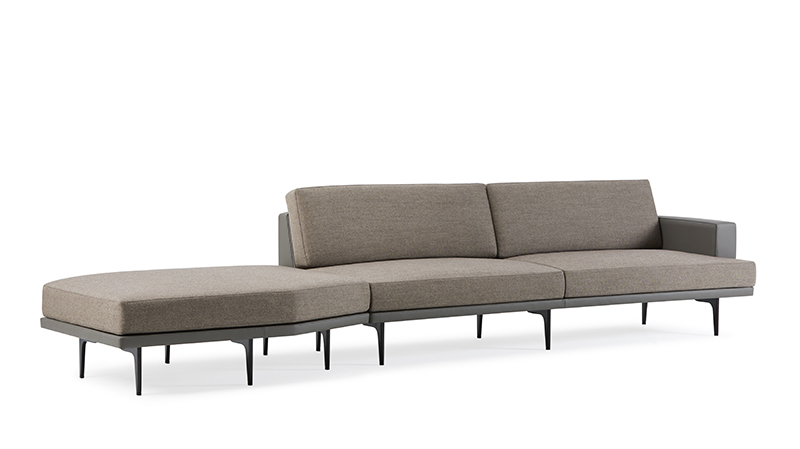An Interview with Lauren Rottet
Lauren Rottet designs everything from hotels to residences, offices, retail, and even ships, so she’s constantly thinking not only about interiors, but the products that we surround ourselves with every day. The official launch of her furniture for Haworth Collection couldn’t be more timely as we anticipate the changes in our workspaces when we return.
Lyda™, a modular sofa collection, was designed to bring flexibility to a range of commercial spaces, including the modern office. We checked in with Rottet to find out her thoughts on the way we work, and how she thinks our workspaces will evolve.
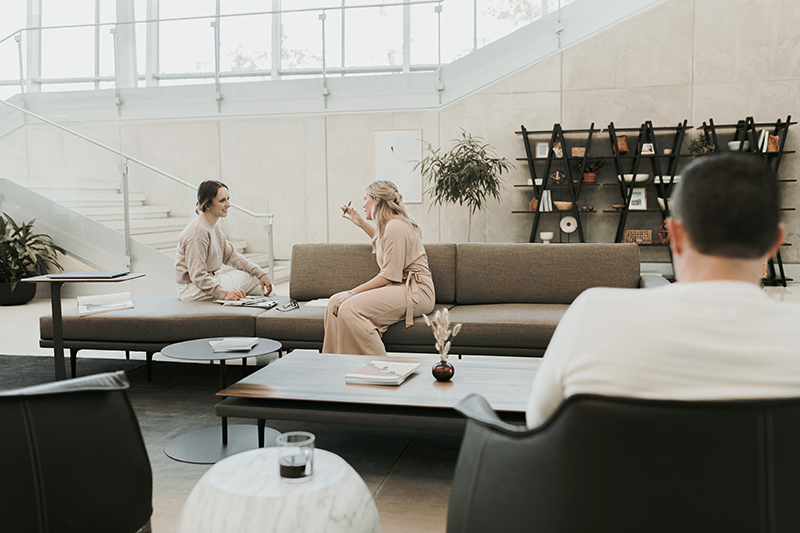
The Lyda sofa was introduced at NeoCon 2019, and marked the first collaboration between Rottet and Haworth. Rottet had been talking about sofas with Kurt Vander Schuur, Haworth’s global brand director, and how they could create a hallmark piece that blended style and comfort. It’s a balance that came easy to Rottet, and she immediately began putting some ideas to paper. “The brief was simple. Haworth wanted a sofa that would have a seat height designed for the American market, but that would fit in with their European collection in terms of the look.”
European sofas are decidedly sleek, but not ideal for the tasks or collaboration that are typical for American employees. Rottet loves the furniture from Italian manufacturer Minotti, but she was conscious of how those kinds of proportions would need to be updated for Haworth. “Those sofas are low. The backs are no higher than 30 inches, and the seat height is about 14 inches. So, that’s great for residential, but not so good for the office.”
Rottet is noted for her deft hand with hotel projects, from designs for Four Seasons, Kimpton, and Langham hotels. It’s no surprise then that she looked to hospitality for inspiration, specifically, a restaurant staple—the banquette. “People love banquettes, and I realized it’s by far the most efficient type of seating. You can have a little table in front of you, and you still have a lot of room for your body. You can sit cross-legged or lay down if you want to, and it saves about 25% square footage.”
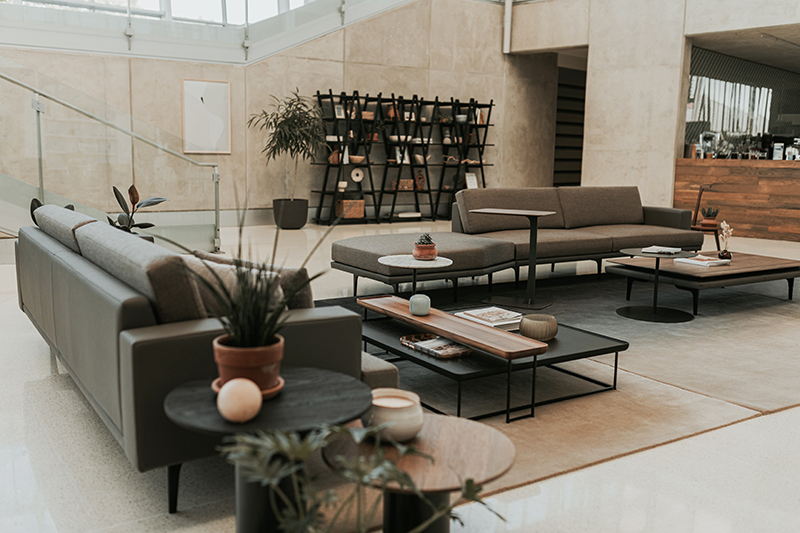
It is this practicality married with form that defines the Lyda, just as Rottet intended. “I really didn’t want this to be just another sofa. I started thinking about it as a new work platform. It’s an alternative to the desk. That meant not only was height key, but also the thickness of cushions for optimal comfort. “You can sit and work on your laptop, and you don’t feel like you need to put a pillow behind you to hold you up,” she added.

Expertly crafted in the U.S., the sofa looks like it’s floating – the antithesis of traditional, bulky furniture of the past. “It’s eight inches off of the floor, and then the platform is laid on top of the frame, which is eight inches up. And then on top of that is your seat cushion, with the arms set back. It’s architecturally constructed,“ Rottet noted.
Much has changed since we had our first glimpse of the Lyda, including working from home 24/7 and a halt to indoor dining because of the pandemic. Yet Rottet said she wouldn’t have designed the sofa any differently, because she believes that socializing with colleagues will be important as we work together again. “I didn’t design the Lyda thinking that it would be so easily movable, but it’s very flexible in terms of the configurations you can create.”
Indeed, because it can be moved easily to suit a variety of interiors, Lyda can be used to foster camaraderie as well as productivity in hospitality spaces. “We almost never put furniture up against the wall, unless we have a really tiny space. We’ll often move a sofa or chairs in the middle of the room, which allows people to gather, to talk, or enjoy a cocktail hour,” Rottet explained. With a lounge chair, two-seat sofa, and three-seat sofa in the range, there’s an option for larger or smaller rooms.
It’s also a sofa that’s meant to be seen, and the sumptuous upholstery can be viewed from any angle. A number of leather and Kvadrat fabric options are available. That extra attention to material often makes people stop and take a second look. Rottet initially envisioned the Lyda’s front and the back being wrapped in leather, but they don’t have to be. The cushions can also showcase a pattern for extra surface interest; if preferred. “It was designed with the front and rear view in mind. It’s really quite pretty from the back,” Rottet said.
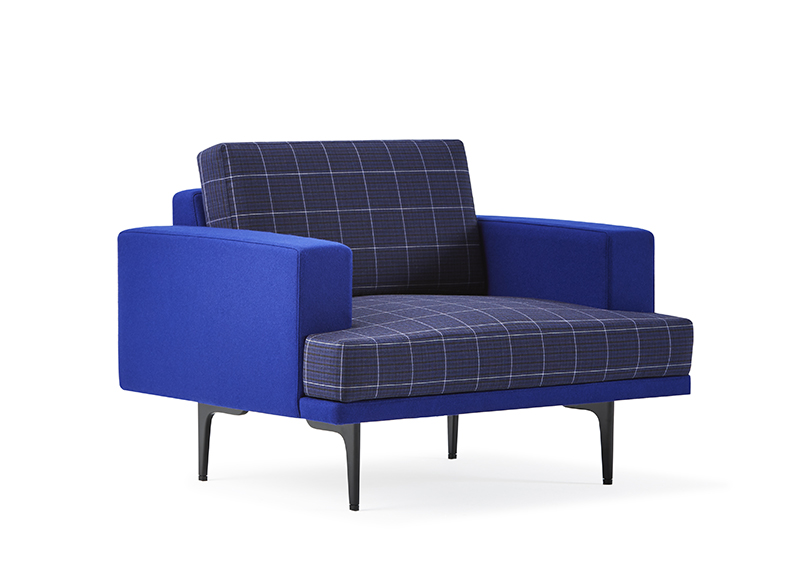
Assigned seating will be a thing of the past, and Rottet noted that we probably won’t get rid of existing furniture. We’ll use the items we have and configure them to fit in new, socially-distanced layouts. Each worker will have less dedicated space for themselves in the office, but Rottet said the areas that we do have will be more thoughtfully designed. “We’ve been working from the comfort of our homes, so no one will want to come into an office with a stiff sofa, and a stiff desk with everything perfectly aligned.”
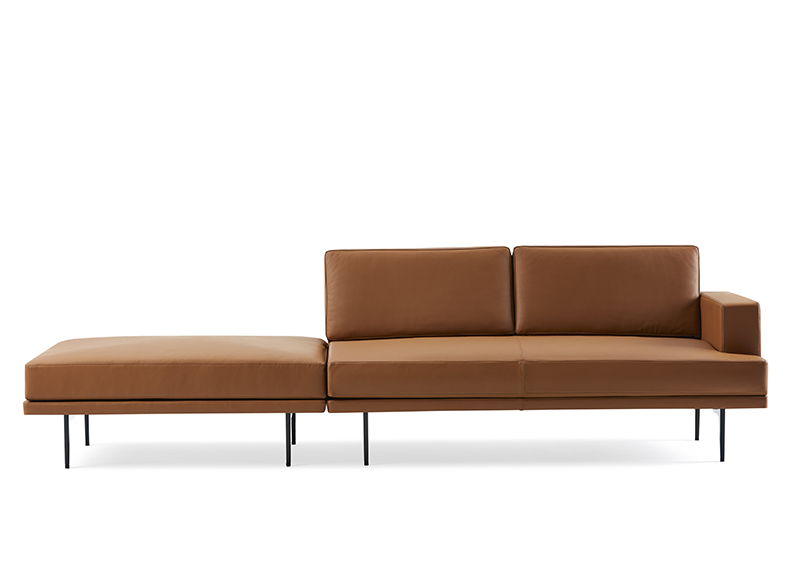
Staid offices are finished, and we’re phasing out the interiors on the other end of the spectrum, too. Every corporate workplace was becoming a carbon copy of a Google hub, complete with colors that were too bright, furnishings with little function, and over-the-top amenities like rock-climbing walls. As Rottet pointed out, all of the costly perks and trendy design have done little to foster employee retention. “People aren’t asking for things like pool tables or ping-pong tables anymore. Our clients really prefer residential, comfortable environments.”
Rottet said we’ll see more of an emphasis on connecting with nature, and that means making sure employees can go outside when they want to. She added that even though there’s a focus on surfaces which are easy to clean, she’s just as concerned about air quality. She’s counting on fellow architects and designers to look at the issue more closely post-COVID. “We’re seeing a lot of buildings that have more outdoor space, so that people have access to sunlight and fresh air. There’s just nothing better, and it’s crucial.”
Whatever Rottet creates next, whether for indoors or out, it will be with a work-life balance in mind. “The world has gotten much more casual, so I think it’s really logical to think of coming back into the office, and working around social gatherings.”
